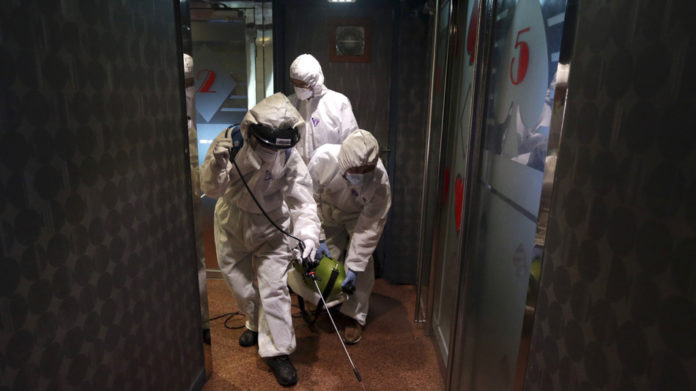As death toll hits 19, World Health Organization says MERS outbreak is slowing

The death toll in the ongoing outbreak of the Middle East Respiratory Syndrome (MERS) in Korea ticked up to 19 on Tuesday as the World Health Organization (WHO) said that the spread of the disease is actually showing signs of slowing.
Even so, additional precautions remain in place to try to prevent the spreading of the disease, and Korean hospitals are beginning to experiment with a new form of treatment for those who have been diagnosed with MERS, according to a WHO statement released on Monday.
WHO blames “doctor shopping”
The WHO said that, based on a slow-down of reported cases, the spread of the disease appears to be abating, though it’s not yet known if newly implemented “containment measures” are to credit.

Image: Lee Jin-man/Associated Press
The organization also detailed complications from what they to believe to be the “index” case in late May: the patient’s failure to report his recent travel to the Middle East and the fact that early MERS symptoms resemble many other common viruses, including the flu, made it difficult to diagnose the case.
Symptoms of MERS include fever, cough, and shortness of breath.
The U.N. health organization also cited South Koreans’ practice of “doctor shopping” as a likely factor that helped propel the disease’s spread to several of the country’s leading health care facilities.
Conditions and cultural traditions specific to Korea have likely also played a role in the outbreak’s rapid spread. The accessibility and affordability of health care in Korea encourage “doctor shopping”; patients frequently consult specialists in several facilities before deciding on a first-choice facility.
Moreover, it is customary in Korea for many family members and friends to visit loved ones when they are in the emergency room or admitted to hospital. It is also customary for family members to provide almost constant bedside care often staying in the hospital room overnight, increasing the risk of close exposures in the health care setting.
As of Tuesday, the WHO reported 154 cases of MERS, 153 of which are in South Korea and one in China.
WHO will continue to actively support the Rep. of #Korea Ministry of Health as it continues to work to bring the #MERS outbreak to an end
— WHO (@WHO) June 16, 2015
Among the new efforts to contain the disease is an experimental plasma treatment that has previously been used to fight other diseases like Ebola. Clinical trials have begun for the treatment, which involves giving patients blood transfusions from others who have recovered from the disease.
Death reported in Germany
The death of a 65-year-old man in Germany on June 6 has now been blamed on complications stemming from an earlier battle with MERS, though not from the Korean outbreak.
While his death wasn’t blamed directly on the disease, he had previously undergone treatment after doctors believe he contracted it from an infected camel at a market in the United Arab Emirates earlier this year. His death, on June 6, is reported to have been caused by an unspecified lung disease. While not releasing any additional personal details about the victim, doctors believe his bout with MERS had weakened his body, making it more susceptible to other infections.
T7. About 3-4 out of every 10 people with MERS have died, most had an underlying medical condition. #abcDrBchat
— CDC (@CDCgov) June 16, 2015
Meanwhile, a South Korean man in Slovakia, earlier suspected of carrying the disease, has since tested negative.
Low risk to Americans, travelers
For Americans traveling to South Korea, there seems to be little risk of contracting the disease, as the South Korean cases have centered around health care facilities. As The Los Angeles Times notes, the only two diagnosed cases in the United States affected people who had traveled to Saudi Arabia, and both made a full recovery after treatment.
T6. CDC does not recommend that anyone change their travel plans because of #MERS. #abcDrBchat https://t.co/p8hUyfSMPn
— CDC (@CDCgov) June 16, 2015
Because of the importance of tourism to its economy, South Korea is now emphasizing the low risk to tourists in a public relations campaign. The government has even gone so far as to offer MERS insurance to entice travelers to fulfill their plans for visiting.
The Strait Times reported a nearly 25 percent drop in tourism in the first of June for the country, a decrease that could cost South Korea nearly $1 billion (U.S.) in revenue if it were to stretch throughout the rest of the summer.
25,000 people cancelled trips to South Korea between June 5-7 : Korea Tourism Organization #MERS #SouthKorea
— David Ingles (@DavidInglesTV) June 9, 2015
Have something to add to this story? Share it in the comments.
